Table of Contents
Brake Fluid Leak on a 2014 Mercedes-Benz E350: A Detailed Case Study
A brake fluid leak is among the most serious brake system faults a Mercedes owner can face. Even a small leak can drastically reduce hydraulic pressure and compromise braking power.
In this case study, we examine a Mercedes-Benz E350 that developed a severe brake fluid leak shortly after a scheduled Service B maintenance.
This incident highlights why thorough brake inspections and proper reconnection of hydraulic components are essential after routine servicing.
For a complete understanding of related systems including ABS, ESP, and Brake Assist see our hub: Mercedes Brake System Problems: ABS, ESP & Brake Assist Guide
Background: Post-Service Brake Fluid Leak
The owner noticed a large puddle of brake fluid under the vehicle after pressing the brake pedal. Within seconds, the brake fluid reservoir was nearly empty, severely reducing braking capability.
The problem appeared just nine days after a Service B inspection performed at a Mercedes dealership.
What Service B Includes
- – Engine oil and filter change
- – Brake system and fluid check
- – Brake pad and rotor inspection
- – Tire rotation and overall safety inspection
Given the timing, the customer initially suspected a maintenance oversight possibly a loose bleeder screw or improperly connected brake hose.
Symptoms & Early Observations
| Observed Symptom | Description |
|---|---|
| Large puddle under rear wheel | Brake fluid pooling behind the passenger-side rear tire. |
| Low fluid reservoir | Reservoir nearly empty after each pedal press. |
| No dashboard warning initially | Fluid loss was sudden, before the level sensor triggered. |
The fluid location and pattern indicated a rear brake circuit leak, requiring immediate inspection.
Inspection & Diagnosis
Step 1: Visual Inspection
After removing the rear passenger tire, the technician confirmed the leak was not from the bleeder screw, but from the junction between the rigid brake line and the flexible hose.
A closer look revealed traces of fresh fluid at the flare fitting confirming hydraulic leakage at the connection point.
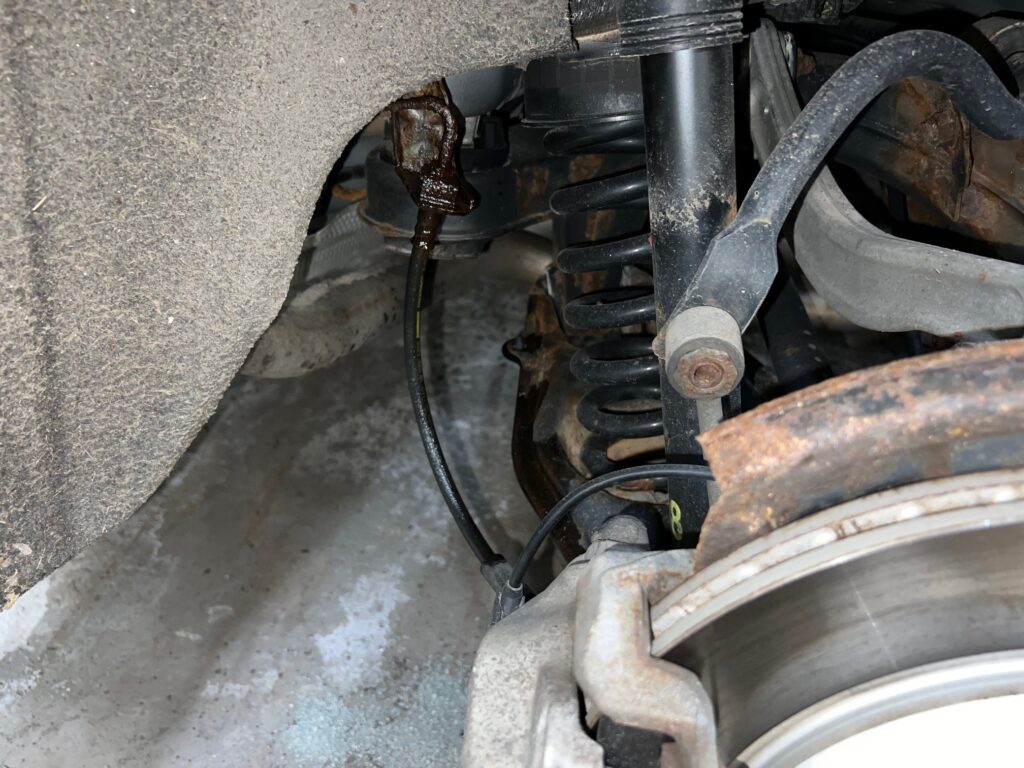
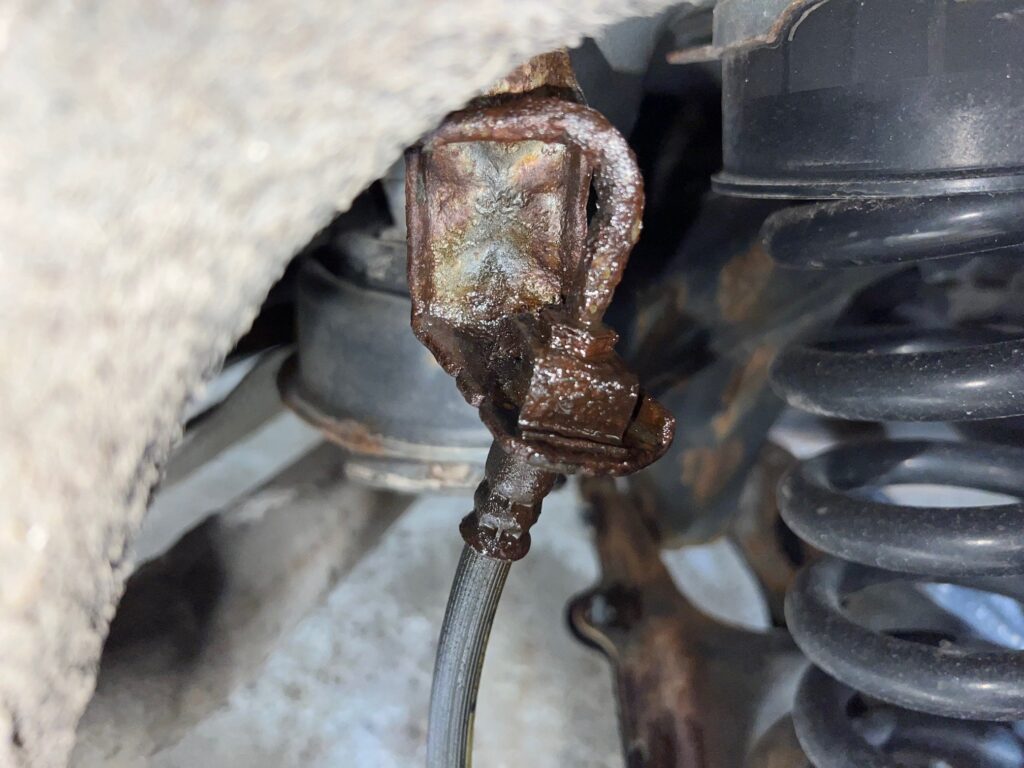
Step 2: Evaluating Potential Causes
| Possible Cause | Description |
|---|---|
| Improper connection during Service B | The line or hose may not have been fully tightened during maintenance. |
| Disturbed fitting or seal | The joint may have loosened slightly after recent service movement. |
| Pre-existing weakness | A prior issue could have worsened under pressure after fluid replacement. |
After a pressure test and inspection, the cause was confirmed as a loose or insufficiently tightened line fitting between the rigid and flexible brake hose.
Repair & Resolution
Step 1: Tighten the Connection
The leak was resolved by correctly tightening the junction between the rigid brake line and the flexible hose using the proper torque specification.
Step 2: Refill and Bleed Brake System
- – Refilled the brake fluid reservoir with fresh DOT 4+ fluid.
- – Bled the entire brake circuit to remove trapped air and restore hydraulic balance.
Step 3: Final Testing
A test drive and pressure test confirmed:
- – No leaks at the connection point.
- – Proper pedal firmness and braking response.
- – Reservoir level stable after 48 hours of monitoring.
Outcome: Brake system restored to full functionality; no recurrence of the leak.
Understanding Brake Fluid Leaks in Mercedes Vehicles
Brake fluid is the lifeblood of your Mercedes braking system.
It transfers pressure from the brake pedal to the calipers and is also crucial for ABS, ESP, and Active Brake Assist operation.
Common Causes of Brake Fluid Leaks
| Component | Typical Fault |
|---|---|
| Brake lines & hoses | Aging, corrosion, or poor connection. |
| Calipers / wheel cylinders | Seal wear or piston leaks. |
| Master cylinder | Internal seal failure or reservoir crack. |
| Bleeder screws | Loose or improperly torqued during service. |
How to Identify a Brake Fluid Leak
Visual Signs
- – Slick, oily puddle (usually clear to yellowish) near the wheels or under the car.
- – Brake fluid level consistently dropping.
- – “Brake” or “ESP” warning lights on the dashboard.
Performance Symptoms
- – Spongy or soft brake pedal.
- – Longer stopping distance.
- – Unusual noises during braking (squeal or grind).
If any of these occur, stop driving immediately continued operation can result in total brake failure.
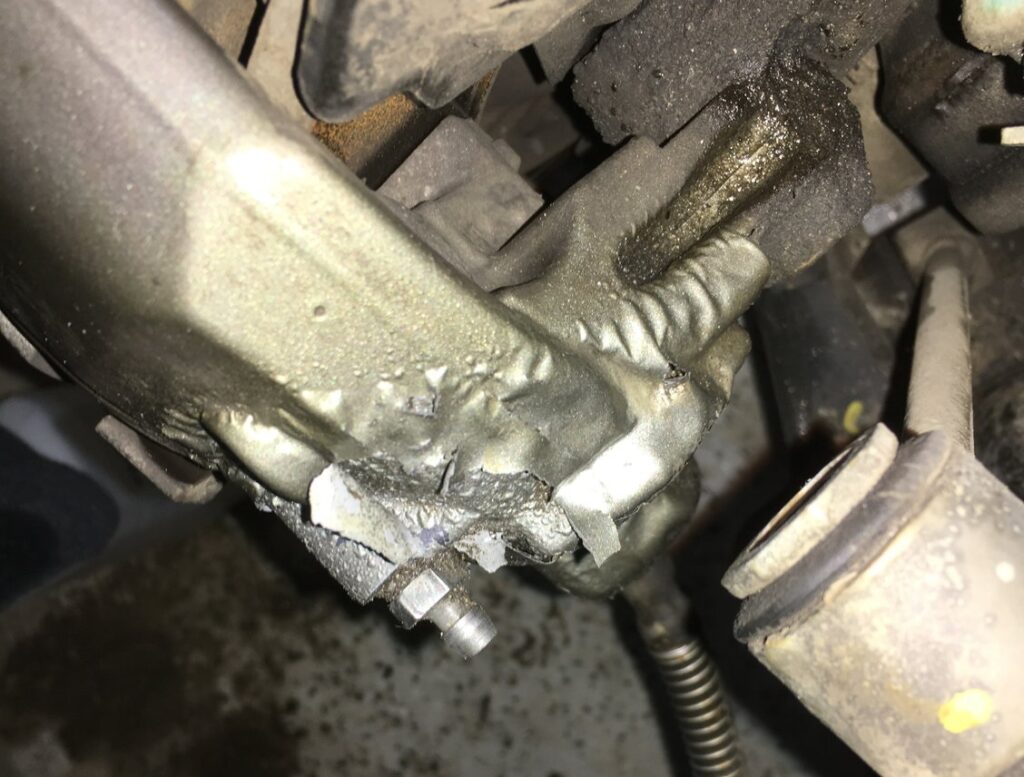
Advanced Diagnostic Techniques
| Tool / Method | Purpose |
|---|---|
| Pressure Tester | Pressurizes brake system to detect small leaks. |
| UV Dye Detection Kit | Highlights leak source under UV light. |
| XENTRY Diagnostic System | Scans ABS/ESP units for pressure or valve faults. |
Mercedes-Specific Diagnostic Tip
Using XENTRY, technicians can check pressure retention in each brake circuit and confirm if the leak affects a specific caliper or hydraulic zone.
Repair Options for Brake Fluid Leaks
| Fault Type | Repair Action |
|---|---|
| Cracked hose or line | Replace component and re-bleed system. |
| Faulty master cylinder | Rebuild or replace. |
| Leaking caliper piston | Replace seals or full caliper. |
| Loose fitting (like this case) | Retorque and recheck pressure. |
Always finish any repair with a complete brake bleeding process to remove trapped air.
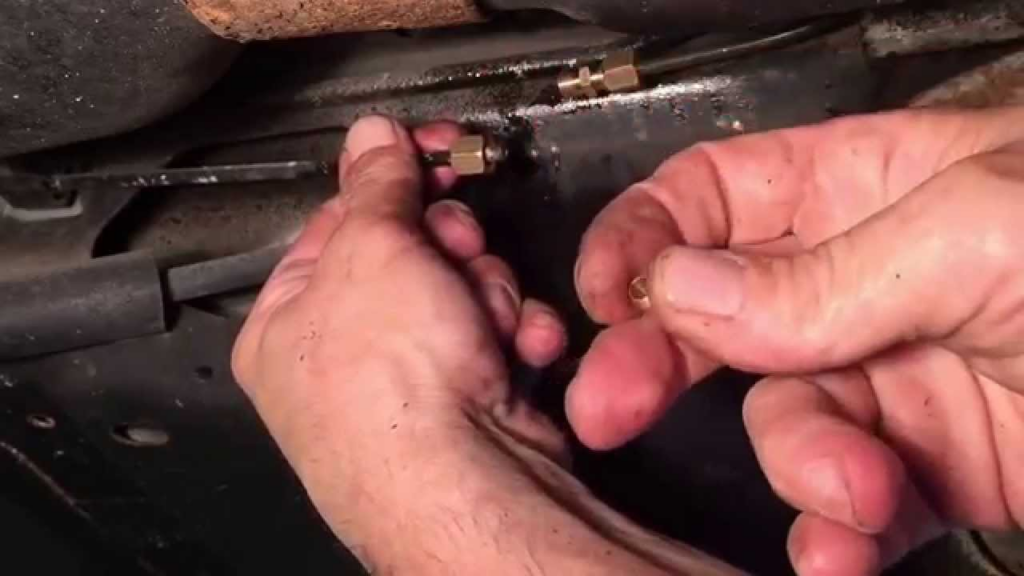
Cost Considerations
| Component / Service | Typical Cost (USD) |
|---|---|
| Replace brake hose or line | $150–$300 |
| Replace master cylinder | $200–$400 |
| Full system bleed & fluid | $100–$150 |
| Genuine Mercedes parts | Higher cost, better long-term reliability |
Prevention & Maintenance Tips
- – Check brake fluid every 6 months or at each service interval.
- – Replace fluid every 2 years (DOT 4+ recommended).
- – Avoid mixing different fluid types.
- – Inspect fittings and hoses after every major service.
- – If performing DIY brake service, always use torque specs from Mercedes repair data.
FAQs
Q1: What causes sudden brake fluid loss after service?
Usually a loose bleeder screw or line fitting, or a disturbed connection during brake bleeding.
Q2: Can I drive if I see brake fluid leaking?
No, fluid loss means your hydraulic pressure is compromised. The vehicle must be towed and repaired immediately.
Q3: Which brake fluid does Mercedes use?
Most modern models, including the E-Class W212/W213, require DOT 4+ brake fluid.
Q4: Can air in the brake line cause a warning light?
Yes, trapped air can trigger the brake warning or ESP fault and cause spongy pedal feel.
Conclusion
This case study demonstrates that even a small connection oversight can lead to a major brake fluid leak and dangerous loss of braking power.
By tightening the rigid-to-flex hose connection and bleeding the system correctly, technicians restored the E350’s brake system to full performance.
Brake fluid leaks should never be ignored. They compromise not only pedal feel but also critical safety systems like ABS and ESP.
For a broader view of how Mercedes braking and stability systems interconnect, read our hub: Mercedes Brake System Problems: ABS, ESP & Brake Assist Guide
Author Bio
Mercedes Expert is an automotive technical trainer and Mercedes-Benz diagnostics expert with extensive hands-on experience in XENTRY, DTS Monaco, and advanced system troubleshooting. He specializes in transforming real workshop case studies into structured learning content to help technicians, car owners, and enthusiasts understand complex vehicle systems.
Last update: October 2025

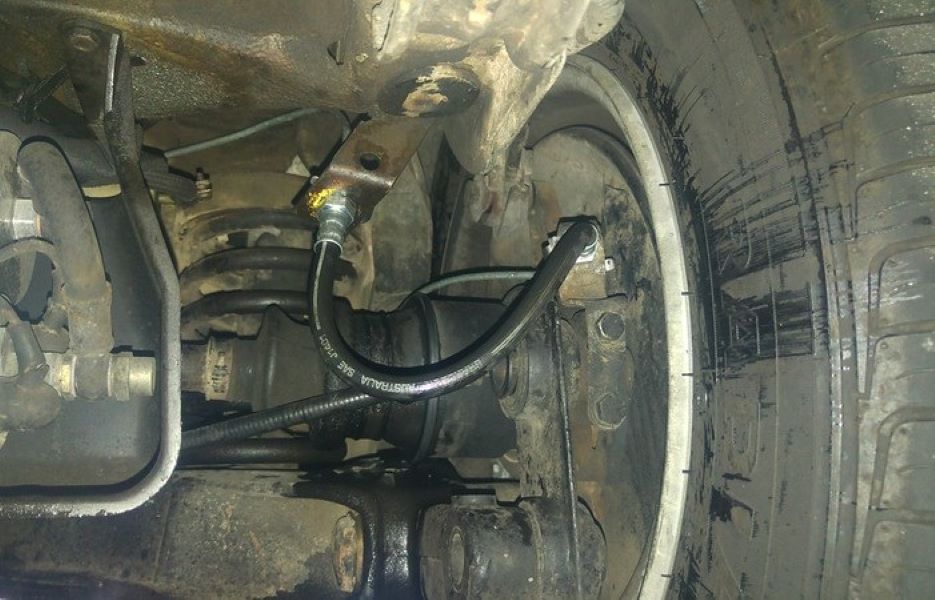
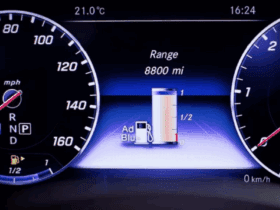
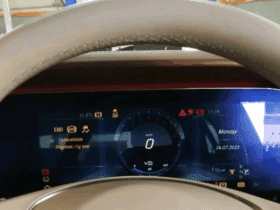
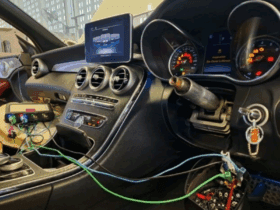
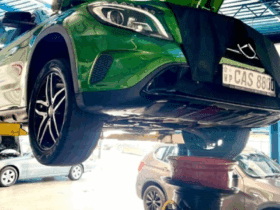
Leave a Reply